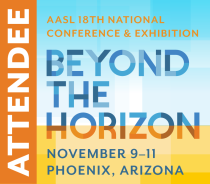Hilda K. Weisburg on the new AASL Standards
Recipient of the 2016 American Association of School Librarians' (AASL) Distinguished Service Award, in this post Hilda K. Weisburg explores the six Common Beliefs of the new AASL Standards. Her latest ALA Neal-Schuman book is Leading for School Librarians: There Is No Other Option.
Are you ready for the new AASL National School Library Standards for Learners, School Librarians, and School Libraries or are you feeling some trepidation about them? As a leader, you must get up to speed rapidly so you can tweak and revamp your lessons as necessary. It is natural to want to cling to what you have known and used since 2007, but stop and think – it's been ten years. How much has the world changed since then? How much have you changed? You – and your students – are doing things you couldn't possibly have done, or even imagined, then.

The new standards will be brought out at the AASL Conference in Phoenix, November 9-11. I will be there and attending one of the pre-cons on them on Thursday. There's still time to put in a pre-publication order so you will be ready to go as soon as possible. Click HERE to go to the order page for the National School Library Standards. And HERE for the AASL Standards Framework for Learners Pamphlet preorder.
Meanwhile, AASL has set up a portal to get you started by providing the philosophical base of the new standards. I recognized the need for new standards but there was so much in the old ones that I liked, I had a few concerns. Thanks to the portal, I am eager and more prepared to embrace the new. Let's walk through them together.
Start with the Common Beliefs. The existing standards had nine. The new ones have six. The first, "The school library is a unique and essential part of a learning community," promotes the program on a far wider scale than the old which stated, "School libraries are essential to the development of learning skills." As in the old standards, a short paragraph explains the Belief in more detail:
- As a destination for on-site and virtual personalized learning, the school library is a vital connection between school and home. As the leader of this space and its functions, the school librarian ensures that the school library environment provides all members of the school community access to information and technology, connecting learning to real-world events. By providing access to an array of well-managed resources, school librarians enable academic knowledge to be linked to deep understanding.
The second breaks new ground by declaring the worth of librarians. "Qualified school librarians lead effective school libraries," positions us as indispensable, stating:
- As they guide organizational and personal change, effective school librarians model, promote, and foster inquiry learning in adequately staffed and resourced school libraries. Qualified school librarians have been educated and certified to perform interlinked, interdisÂciplinary, and cross-cutting roles as instructional leaders, program administrators, educators, collabÂorative partners, and information specialists.
Complimenting Common Core, the third belief states, "Learners should be prepared for college, career, and life." The explanatory paragraph addresses our unique contribution to student learning:
- Committed to inclusion and equity, effective school librarians use eviÂdence to determine what works, for whom and under what conditions for each learner; complemented by community engagement and innoÂvative leadership, school librarians improve all learners' opportunities for success. This success empowÂers learners to persist in inquiry, advanced study, enriching professional work, and community particiÂpation through continuous improveÂment within and beyond the school building and school day.

Mirroring, "Reading is a window to the world" from the old standards, the fourth proclaims, "Reading is the core of personal and academic competency." We must never forget our commitment to literacy and the accompanying paragraph succinctly defines it.
- In the school library, learners engage with relevant information resources and digital learning opportunities in a culture of reading. School librariÂans initiate and elevate motivational reading initiatives by using story and personal narrative to engage learners. School librarians curate current digital and print materials and technology to provide access to high-quality reading materials that encourage learners, educators, and families to become lifelong learners and readers.
Much like "Equitable access is a key component for education," the fifth Common Belief is, "Intellectual freedom is every learner's right." Our profession is staunchly committed to this right and has officially been so since ALA's Bill of Rights was first adopted in 1939. The new Common Belief states:
- Learners have the freedom to speak and hear what others have to say, rather than allowing others to control their access to ideas and information; the school librarian's responsibility is to develop these dispositions in learners, educators, and all other members of the learnÂing community.
The final Common Belief is, "Information technologies must be appropriately integrated and equitably available." This is a call to action as so many schools do not have adequate information technologies, and the new standards recognize that with this supporting paragraph:
- Although information technology is woven into almost every aspect of learning and life, not every learner and educator has equitable access to up-to-date, appropriate technology and connectivity. An effective school library bridges digital and socioeconomic divides to affect information technology access and skill.
Do you think anything is missing from these Common Beliefs? Don't be too quick to decide. The new standards also have six Shared Foundations, summarizing Competencies for Learners. The infographic link shows how learners Think, Create, Share, and Grow with each of them, and how librarians lead the way.
There is certainly lots to take in and learn, which makes me grateful for this preview from AASL. I was very proud in 2007 of AASL's Standards for the 21st-Century Learner. I think I am going to be even prouder to represent and lead from these. I can't wait to dig into them.
What do you think of these beginning documents? Is there anything that stands out for you? Are there any which particularly that excite or motivate you? What are you doing to get ready for the new standards?
(This post originally appeared in a somewhat different form at Hilda K. Weisburg's blog.)


